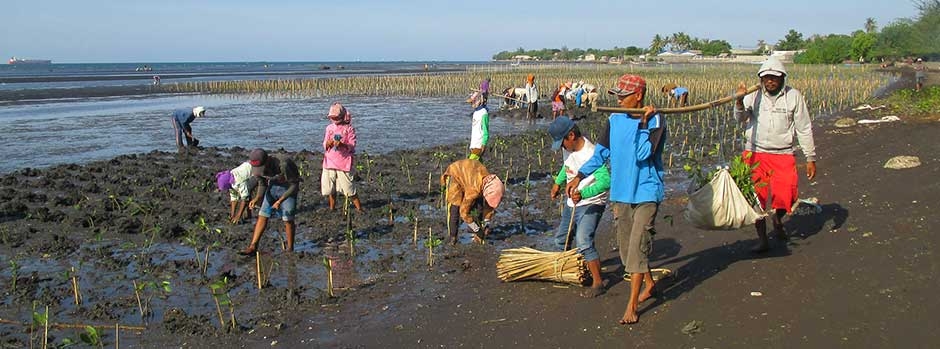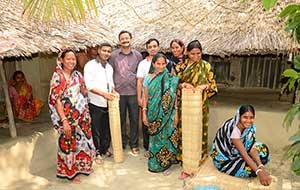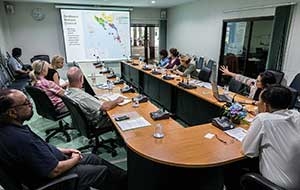Knowledge Hub :: MFF Solutions
MFF Solutions

Community members work together to rehabilitate mangroves an ... , Indonesia © MFF Indonesia
The notion of resilience is synonymous with preparedness in the face of the unknown (or the partially known, changing and complex). Resilience is the ‘flip side’ of vulnerability, and can be characterized as the ability of communities to recover from shocks - episodic surprises from nature or society.
“Resilience starts from the belief that humans and nature are strongly coupled to the point that they should be conceived as one social-ecological system. This means that in our globalized society, there are virtually no ecosystems that are not shaped by people and no people without the need for ecosystems and the services they provide.” Stockholm Resilience Center
This is most clearly exhibited when a community is dependent on a single resource e.g. a single agricultural crop, or fish stock, but in many cases the dependency relates to the recovery speed and buffer capacity of the entire ecosystem as it’s the case for most coastal regions of Asia. Although the complexity of tropical coastal resource systems significantly increases resilience against economic misfortune, the dependent communities still rely on a single coastal system and are then vulnerable to hazards. An oil spill, for example, may affect the supporting ecosystem and impact its multiple services including tourism, fishing and aquaculture.
The resilience of social systems (e.g. a coastal community) is related to both the resilience of the ecological systems on which they depend, and the resilience of the institutions, or governance, within the social systems themselves. Resource dependency is defined by reliance on a narrow range of resources leading to social and economic stresses within livelihood systems. In this way, resource dependency relates to communities and individuals whose social order, livelihood and stability are direct functions of their resource production and localized economy.
Environment
Coastal environments are areas of high ecological complexity and hence their restoration and sustainable management is a highly challenging prospect. The coastal environment is also critically important for the resilience of local communities who are dependent on them for the services they provide, and for their income, livelihoods and overall well-being. Local people are not just recipients of these services but also exert direct influence on the nature and providing capacity of ecosystems.
MFF recognizes that a holistic approach is necessary to maintain healthy coastal ecosystems. It recognizes the need to better equip the institutions that work on the ground and enabling local communities to be engaged in sustainable management of the coastal environment and its resources.
Here you will find examples of projects that have been implemented by MFF that have contributed to strengthening resilience of coastal communities by addressing environmental issues. Click here to find out more...>>
Empowerment
Social empowerment underpins resilience and therefore effective and sustainable ecosystem management solutions must engage individuals and communities. Social empowerment is also an important foundation for good governance.
MFF recognizes the importance of social empowerment in building resilient coastal communities, and the significant opportunities for government, civil society, the private sector and others to contribute positively to realising social empowerment through ecosystem-based management practices.
Here you will find examples of projects that have been implemented by MFF that have contributed to strengthening resilience of coastal communities by addressing empowerment through civil society engagement, building capacity, supporting diversified and sustainable livelihoods, and addressing gender specific issues in the coastal resource management context. Click here to find out more...>>
Governance
The way states and local actors structure, restructure and reorganize their governance systems affect the level of resilience in the face of increasingly severe natural and manmade shocks and stresses.
In order to address the wide range of issues and needs related to resilience of coastal communities and environments, a holistic approach towards governance is essential. The opportunity to participate in decision making processes which are fair, accountable, open is essential for equitable and resilient societies. In coastal areas this involves the adoption of dynamic and multidisciplinary systems like integrated coastal management (ICM) that converge ecosystem protection and sustainable development.
Here you will find examples of projects and activities that have been implemented by MFF and have contributed to strengthening resilience of coastal communities by addressing governance related issues. Click here to find out more...>>


